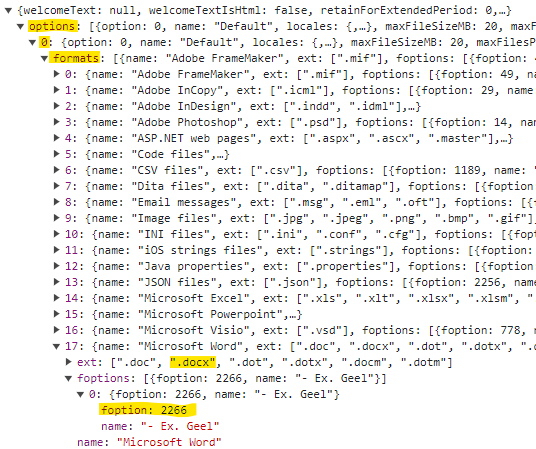This method translates files using submits one or more files for translation using the MT Hive service.
Please note that the file or files need to be uploaded first. Only then would you call the present method. See below for details.
URL
(POST) /api/apps/mthive/translate/files
...
Parameters are included as a JSON object in the request body:
files | Mandatory. |
A list of the previously uploaded files that you submit for translation. Each file is listed with its file token and the file format ID to use. Example:
See below on how to upload files and obtain the file tokens. | object[], Mandatory | ||
| src | The source language code. Make sure to only use source languages according to the MTHive configuration. | string, Mandatory | |
| trg | Mandatory. The target language code. Make sure to only use target languages according to the MT Hive configuration. | string, Mandatory | |
| profileOptionIdx | The option index for the selected Mt Hive configuration (Zero-based index). MT Hive lets you specify multiple profiles, see "Settings" > "MT Hive" (see Administration of MT Hive) | int, Mandatory |
FILES AND CONFIGURATIONS
The API requires a file token and a format ID. The former references a previously uploaded file. The latter the file filter configuration ID (or format ID) to use for processing.
To upload a file use this API method: media/upload. It returns a token that you would include with the payload (see files above).
The parserId field designates the file filter configuration to use to process the file. You find the available options for each type of file in the configuration under node /options/{option index}/formats/{file type}/foptions[*]/foption
Example:
Here a single option (2266) is available for Microsoft Word files. Since the configuration lists the supported file extensions, it is relatively easy to automate a lookup mechanism in code.
Note that multiple options may be available for a specific type of file. In such a case, MT Hive should propose both options to the user and preselect the first option by default.
Using an ID that does not exist will result in a failure.
RESULTS
The method executes asynchronously. It returns the operation ID which is a number.
...
